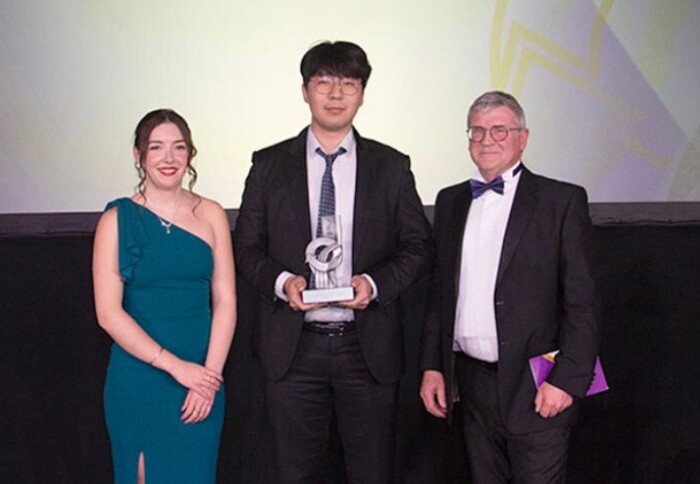Imperial spinout wins big at IChemE Awards

DyeRecycle's Ziyin Chen, Senior R&D Engineer (centre), collecting the IChemE Award
DyeRecycle, a spinout from Imperial’s Department of Chemical Engineering, applauded for their sustainable drive.
The 2024 IChemE Global Awards acknowledged DyeRecycle's determination to reduce dye pollution and textile waste, presenting them with a prestigious award.
DyeRecycle uses a unique formula, making use of green chemistry to give discarded fabric a new lease of life by salvaging their dyes – enabling the colour from an old garment to be extracted, revived and used to dye new fabrics, while also recovering the waste textiles.
The DyeRecycle team – Dr Aida Rafat (CEO and Co-founder), Professor Jason Hallett (Co-founder), Jiaying Chen, Lamar Balubaid, Jehna Yang, Ziyin Chen, Antonio Overjero Prez and Irene Maffini – are all current or former Department of Chemical Engineering students.
We’re excited about the company’s future as we move into our piloting phase over the next year, and prepare for our first designer fashion products to launch in 2025. Co-founder, DyeRecycle Professor Jason Hallett, Department of Chemical Engineering
On winning this prestigious award, Professor Jason Hallett, co-founder of DyeRecycle states, "We are absolutely thrilled to have won this award from the IChemE, recognising DyeRecycle’s potential to revolutionise the circularity of textile wastes and colours. We’re excited about the company’s future as we move into our piloting phase over the next year and prepare for our first designer fashion products to launch in 2025".
Unique technology behind DyeRecycle
The unique dying process is enabled by an innovative technological solution that offers a unique low-cost circular model for the extraction, recovery and recycling of dyes from textile waste.
A green chemical solvent selectively extracts the dyes from waste fibres, leaving a decoloured fibre as a clean, dye-free input appropriate for mechanical and chemical fibre recyclers.
The dye-rich chemical can then be used as a dye bath to recolour new fabrics, or the dye can be extracted and sold on. This is the first technology to introduce the concept of recycled synthetic dyes.
Recycled existing dyes enable the provision of a wide variety of vibrant colours that meet market demand while maintaining industry standards.
DyeRecycle creates a new category of circular dyes – recycled synthetic dyes. A clear advantage of this category compared to other novel sustainable dyeing solutions is ease of implementation, as recycled synthetic dyes can be readily adopted by fabric dyers with no new processes or specialised equipment required.
A second big contribution to a circular economy is the recycling of the textiles, as the process does not damage the fabric and turns them into clean fibers with much higher value than current processes.
ChemEng Enterprise: a rich history, an exciting present, a bright future
This is the latest success of the highly successful decentralised Enterprise support programme launched by the Department of Chemical Engineering, unique within Imperial College London.
Professor Sandro Macchietto, Director of Enterprise, said: "Support from our Pre-seed fund and mentoring at a very early stage enabled the DyeRecycle team to de-risk the technology and refine their business proposition ahead of launch. DyeRecycle is an excellent example of how successful research can be helped to spin out by planning and supporting the commercialisation journey from the beginning. I am extremely proud to see Aida and team receive these accolades!”.
The ChemEng Enterprise programme includes a pre-seed funding scheme, extensive advice and mentoring, support of interactions with Imperial and funders, and a yearly ChemEng Enterprise Day bringing together founders, early investors, mentors (alumni and professional) to network at the earliest possible stage.
Find out more about ChemEng Enterprise.
2024 IChemE Global Awards press release.
Photo credit: IChemE.
Article text (excluding photos or graphics) © Imperial College London.
Photos and graphics subject to third party copyright used with permission or © Imperial College London.
Reporter
Navta Hussain
Department of Chemical Engineering